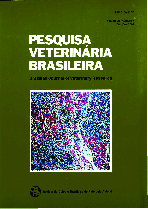 |
|
|
|
Year 2001 - Volume 21, Number 4
|

|
Evolution of serological antibody titres by the plate agglutination, rose Bengal and complement fixation tests in Nelore heifers (Bos indicus) vaccinated at 18 months of age with Brucella abortus strain 19, 21(4):139-142
|
ABSTRACT.- Mathias, L.A., Chaves, L.F., Chen, A.A., Girio, R.J.S. & Valério Neto, W. 2001. [Evolution of serological antibody titres by the plate agglutination, rose Bengal and complement fixation tests in Nelore heifers (Bos indicus) vaccinated at 18 months of age with Brucella abortus strain 19] Evolução de títulos sorológicos, nas provas de soroaglutinação em placa, antígeno acidificado tamponado e fixação de complemento, em bezerras Nelore vacinadas aos 18 meses de idade com Brucella abortus amostra B 19. Pesquisa Veterinária Brasileira 21(4):139-142. Depto Medicina Veterinária Preventiva e Reprodução Animal, Faculdade de Ciências Agrárias e Veterinárias, Unesp-Campus de Jaboticabal, SP 14884-900, Brazil.
One hundred and eight Nelore heifers (Bos indicus) about 18 months of age were vaccinated with a standard dosage (60-120 x 109 viable organisms) of Brucella abortus strain 19 vaccine, airning at to study the persistence of serological antibody titres by the plate agglutination, rase Bengal and cornplement fixation tests. Serum samples were collected just before vaccination and after 45 days, 6, 12 and 18 months. Before the vaccination, all the heifers showed negative results by the three tests. After 45 days, all the heifers had titres higher than or equal to 1/100 by the plate agglutination test and all of them showed positive results by the rose Bengal plate test, while 2 animals had titre 1/2 and 106 animals had titres higher than or equal to 1/4 by the complement fixation test. One year after the vaccination, most of the heifers did not show significant serological antibody titres. Considering the risk to which animals in endemic areas and infected herds are subjected, and considering the clear reduction of the serological antibody titres shown by most of the vaccinated heifers, one rnay assume that, in case of Nelore heifers in endemic areas and that were not vaccinated between 3 and 8 months of age, it would be more reasonable to vaccinate them at 18 months of age than to expose them to a high risk of Brucella infection. |
| |
|
|
| |
|
 |